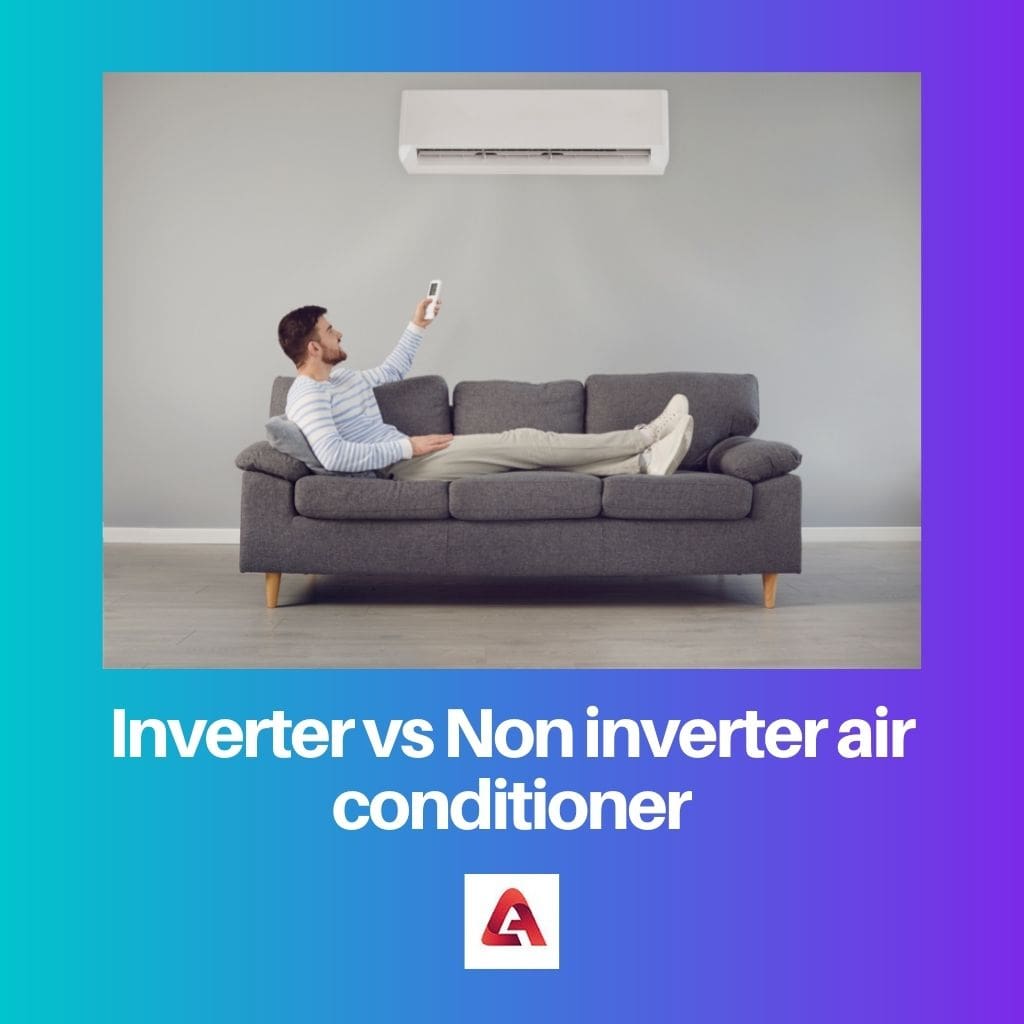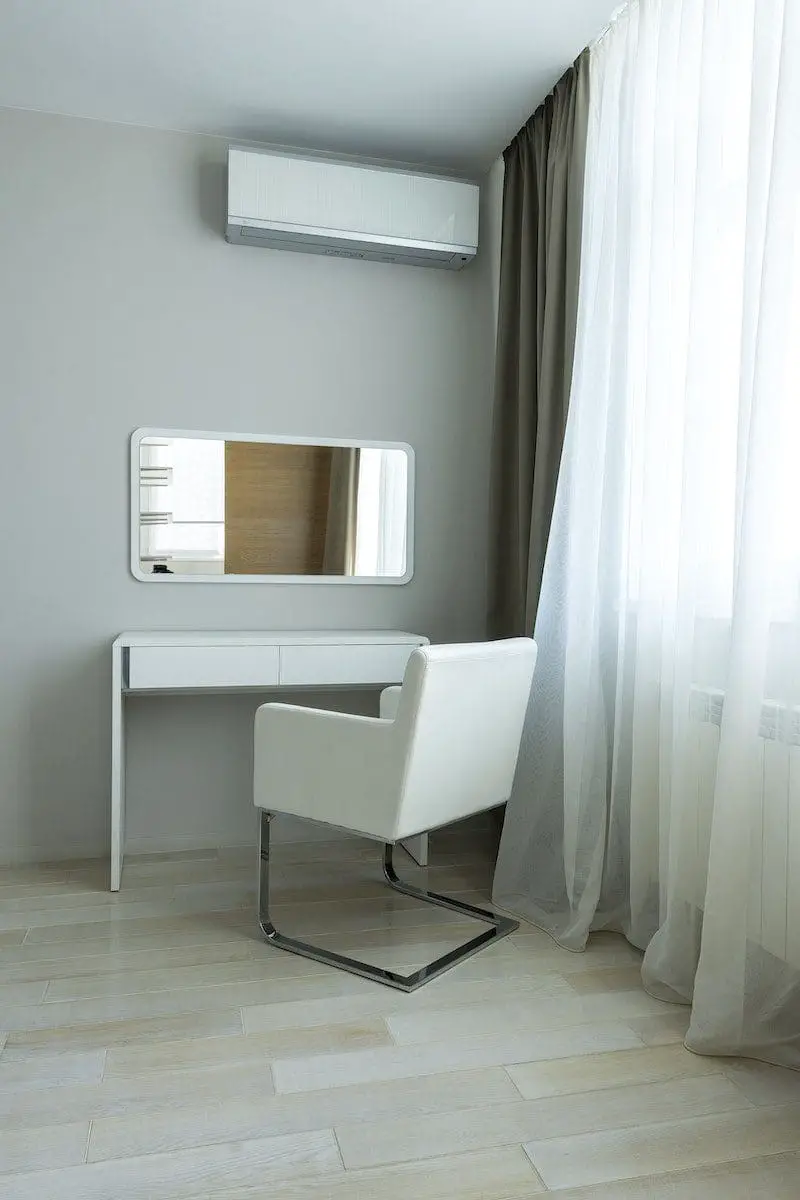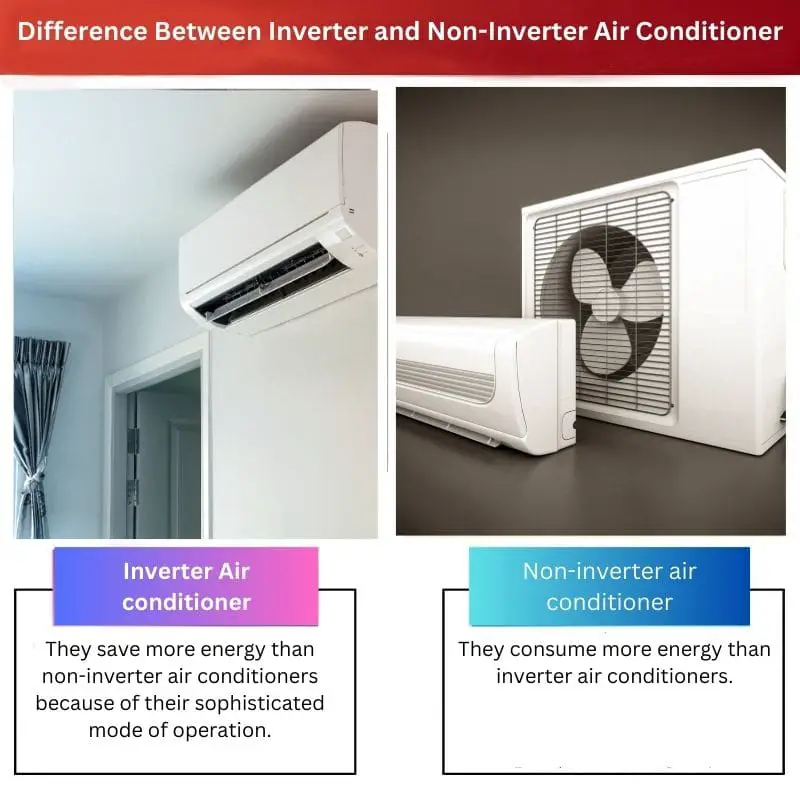When choosing the best air conditioner for his home or office, he will consider the popular inverter and non-inverter air conditioner choices.
Everyone wants the best efficient, eco-friendly, and budget-friendly air conditioner to live comfortably and breathe clean, quality air.
Numerous air conditioners are sold yearly, and an average household spends approximately 10 per cent of its utility bill on only cooling units.
This brings the question of how to choose the best air conditioning unit. There are quite a few elements that affect one’s decision. Still, one of the most significant parts to consider before purchasing one is how to choose between the two technologies: inverter and non-inverter.
Key Takeaways
- Inverter air conditioners use variable-speed compressors to adjust the cooling output, making them more energy-efficient and providing consistent room temperature.
- Non-inverter air conditioners use fixed-speed compressors, which turn on and off to maintain the desired temperature, resulting in higher energy consumption and fluctuations in room temperature.
- Both inverter and non-inverter air conditioners are designed to cool indoor spaces, with inverter air conditioners offering greater energy efficiency and more stable temperature control than non-inverter air conditioners.
Inverter vs Non-Inverter Air Conditioner
Non-inverter air conditioners operate by turning the compressor on and off, resulting in temperature fluctuations and higher energy consumption. Inverter air conditioners use a variable speed compressor to adjust cooling or heating capacity according to the room’s temperature, making them more energy-efficient and providing more comfortable.

Comparison Table
| Parameter of Comparison | Inverter Air conditioner | Non-inverter air conditioner |
|---|---|---|
| Cost | It is more expensive than a non-inverter air conditioner. | It is comparatively less expensive than the Inverter air conditioner. |
| Life span | It has a longer lifespan than non-inverter air conditioners. | Its lifespan is comparatively less than inverter air conditioners. |
| Noise | Inverter air conditioners are quieter when running. | Non-inverter air conditioners make noise while running. |
| Energy efficiency | They save more energy than non-inverter air conditioners because of their sophisticated mode of operation. | They consume more energy than inverter air conditioners. |
| Technology | Its compressor runs at full speed to regulate the temperature as required. | It operates either at full or no power when turned off. |
What is an Inverter Air Conditioner?
An inverter is an energy-saving technology that eliminates unnecessary operation in air conditioners by effectively managing the speed of the motor.
Air conditioners sustain the desired temperature by cooling when the room temperature rises above the desired temperature and heating when the room temperature drops below the desired temperature.
An inverter air conditioner has a varying-speed compressor motor that changes the refrigerant flow inside the unit to manage its cooling and heating capacity as needed. The speed of the compressor motor is directly proportional to the frequency of the power supply.
It uses a variable-frequency sensor to manage the speed of the motor, which regulates the refrigerant flow inside the inverter to supply the right amount of heating or cooling as required.
This helps to get rid of the start-stop cycles, hence improving the air conditioner’s energy efficiency.
The benefit of Inverter Technology:
Every air conditioner has a maximum peak load. A 1.5-ton Air conditioner is suitable for a particular size of room and 1 ton for another size.
A normal air conditioner of 1.5ton capacity will run at an optimum power requirement when the compressor runs. It will run continuously but will pull out only that much power needed to keep the desired temperature.
So, it automatically adjusts its capacity based on the requirement of the room in which it is cooling. Thus, the main benefit of inverter technology is that it draws quite less power and consumes fewer units of electricity than non-inverter technology.
Although the air conditioners with Inverter Technology adjust according to the room temperature requirement, getting the right-sized air conditioner installed in the room is essential.

What is a Non-Inverter Air Conditioner?
An air conditioner unit having a constant-speed compressor motor is a non-inverter air conditioner. Unlike an inverter air conditioner, the compressor automatically goes on and off instead of running at full speed throughout.
The compressor goes off when it reaches the set temperature and resumes again after the temperature increases. Because of the repeated on-off cycles, the compressor always works at high power, which thus creates a lot of noise while running.
It uses more electricity, making the air conditioner less energy efficient than the inverter ones.

Main Differences Between Inverter and Non-Inverter Air Conditioners
- The compressor of the inverter air conditioner runs at full speed constantly to maintain the required temperature. The non-inverter air conditioner runs on an ‘all or none’ based principle, i.e. it operates at either full or no power.
- The inverter technology saves more energy than the non-inverter type because of its effective method of operation. The non-inverter technology uses more electricity because of the constant on-and-off frequency.
- The inverter air conditioner uses a variable frequency method to maintain the speed of the motor and the compressor. On the other hand, a non-inverter has a constant speed compressor that automatically goes on and off all the time.
- The inverter technology does not make a noise while running. The non-inverter air conditioners make a lot of noise while functioning.
- The life span of inverter air conditioners is more than that of non-inverter air conditioners.
- Inverter air conditioners are more expensive as compared to non-inverter air conditioners. The non-inverter air conditioners are less costly than the inverter ones.

- https://www.sciencedirect.com/science/article/pii/S0378778813005963
- https://www.ajol.info/index.php/jfas/article/view/171976

I didn’t understand the point being made in this article at all.
It explained the differences very clearly for me. I now know which air conditioner to choose for my home.
The post was very ironic in its presentation. It made learning about air conditioners an interesting experience!
I agree. The way they put across the information really helped in grasping the concepts.
I think the ironic approach made the post more engaging and easier to follow.
This was very informative, thank you very much for the detailed explanations!
I’ve always been confused about the difference between inverter and non-inverter air conditioners, but this post cleared it up for me. Thanks!
I agree. This has helped me understand the key differences between inverter and non-inverter air conditioners. Great job!
I found this article to be too argumentative and not very objective. They didn’t present both sides of the argument fairly.
I found the arguments they presented to be quite balanced. I don’t think it was too one-sided.
They might not have presented both sides equally, but the information provided was still very educational.
This was very positively informative, useful information to know about air conditioners. I appreciate the clarity of the article.
I’m glad you found it helpful! It’s important to know the differences between these types of air conditioners.
Are the cost and energy efficiency really that different between these two types of air conditioners?
Yes, they are. Inverter air conditioners are more cost and energy-efficient, as explained in the post.
This was a well-researched and informative post about inverter and non-inverter air conditioners.
Totally agree. It’s evident that a lot of research went into providing this detailed insight.
This post was very comical; I couldn’t stop laughing at the way they presented the information!
I don’t think they meant to be comical, but it was light-hearted and easy to read.
Agreed, the post might not be intentionally comical, but I did find it amusing at times.
I didn’t find this helpful at all. This was just full of biased opinions and didn’t provide any concrete evidence.
I think they provided useful facts that help in understanding the technologies behind inverter and non-inverter air conditioners.
The post lacked a sense of sarcasm; otherwise, it would have been perfect!
I think the absence of sarcasm was appreciated here. Sometimes, an informative post is better without it.